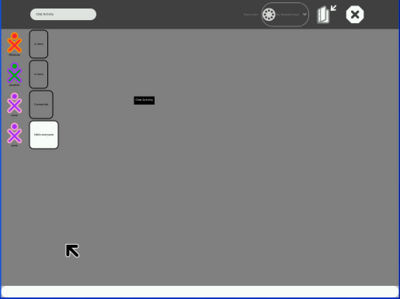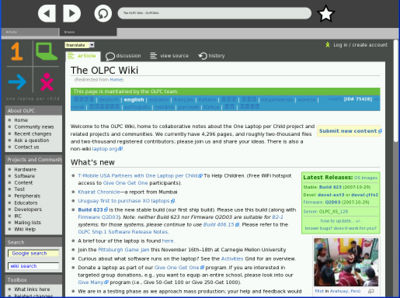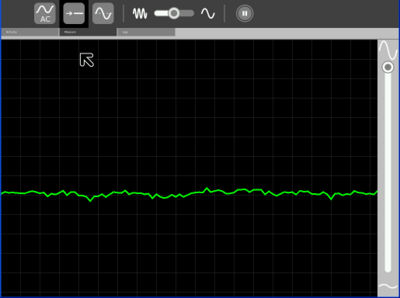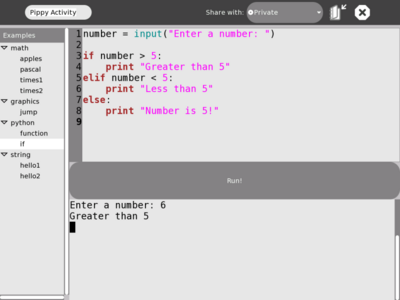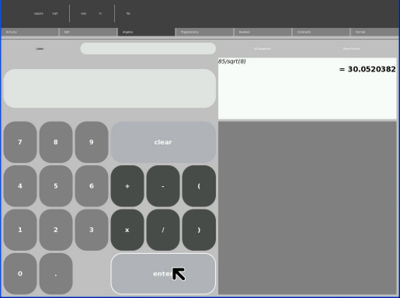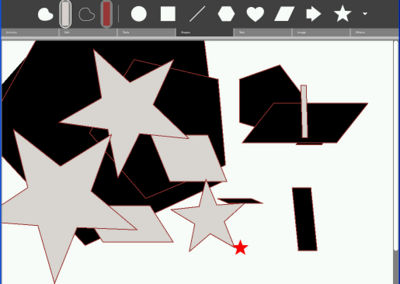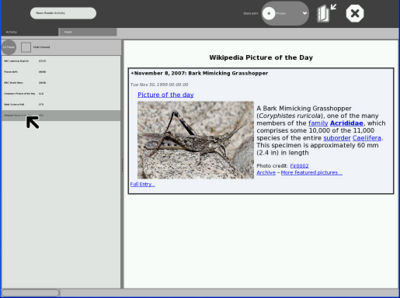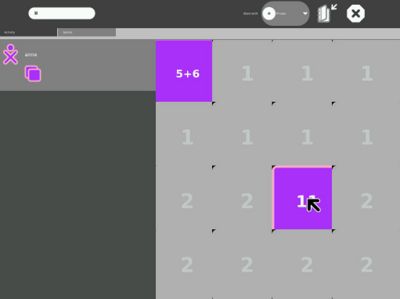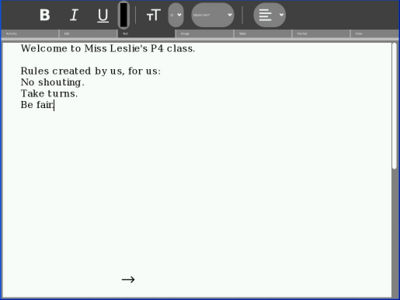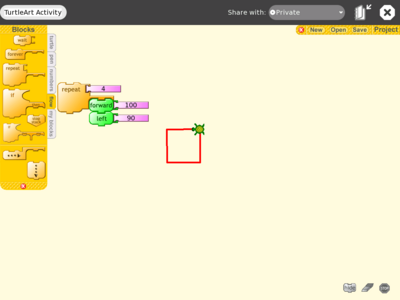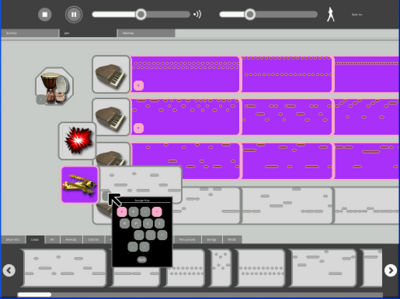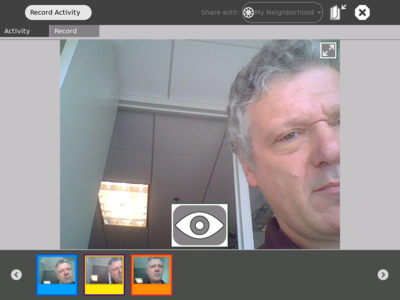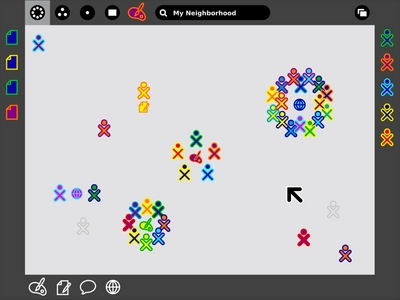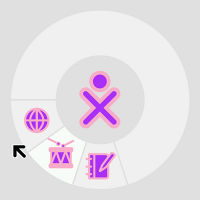Simplified user guide: Difference between revisions
Annegentle (talk | contribs) m (→Being safe with the XO: - adding anti-virus and wireless/internet protection ideas and concepts) |
RafaelOrtiz (talk | contribs) m (-underscores) |
||
| Line 115: | Line 115: | ||
'''Related links''' |
'''Related links''' |
||
*[[OLPC Trial-2 Software Release Notes#Journal and Datastore]] |
|||
*[[OLPC_Trial-2_Software_Release_Notes#Journal_and_Datastore]] |
|||
*[[Journal]] |
*[[Journal]] |
||
*[[OLPC Human Interface Guidelines/The Laptop Experience/The Journal]] |
|||
*[[OLPC_Human_Interface_Guidelines/The_Laptop_Experience/The_Journal]] |
|||
*[[Journal and Overlays]] |
*[[Journal and Overlays]] |
||
*[[Educational activity guidelines#The Journal]] |
|||
*[[Educational_activity_guidelines#The_Journal]] |
|||
*[[Tests/Journal]] |
*[[Tests/Journal]] |
||
*[[Journal/Specifications]] |
*[[Journal/Specifications]] |
||
*[[ |
*[[542 Demo Notes#Journal]] |
||
==Charging the XO battery == |
==Charging the XO battery == |
||
Revision as of 05:15, 28 November 2007
| አማርኛ | العربية | english | español | français | हिन्दी | português | русский | ไทย | italiano | HowTo [ID# 81053] +/- |
Documentation > Simplified User Guide
see also : Demo notes/542 and Demo notes/608
By the Community, For the Community: Introducing the XO
A community of people built the XO laptop and everything within it, with YOU in mind.
The XO laptop is designed to help you, your family, and your community to learn and grow. It is meant to be explored, and enjoyed. It has tools and games to help you expand your knowledge and to have fun. Another purpose of the XO laptop is to help you make new friends, in your own area or across the world. There are groups and communities that you can join, and you can also start your own.
If you have spent time on the Internet, there's a good chance you have heard of Wikipedia, which is a free online library created by people around the world. Wikipedia is one of the most recognized names in the world, thanks to the contributors, and there are many other projects built around the same principles. This includes all of the interesting new activities that have been developed as part of the laptop project, such as Colingo, and many others. We'll be adding more all the time, and so can you!
The important thing to remember is that there is only one serious mistake you can make on the Wikipedia website, or on the XO laptop:
The Mistake: thinking that your contribution would not be helpful.
The reason Wikipedia has been so successful is because it is very helpful; and the reason it is helpful is because of all the people who have taken the time to add or improve something. (And they often end up having fun in the process!) With the community approach, there is something for everyone.
Like any community effort, the XO laptop has great things about it, and it also has room for improvement. Ideas and feedback are one of the greatest gifts that you can give; you don't need to be an expert, you just need to be willing to share your thoughts. And the community would be glad to hear them.
We hope that the XO laptop is helpful, that you enjoy and learn from it. And we hope that someday you will join us in making it better.
All are welcome.
- The XO team
About computers
Your XO is a computer.
What is a computer? A computer is a tool, a classroom, a toy, offering a way to communicate with others. Use your computer for learning, for fun with pictures and games, or for communication. A computer can be whatever you want it to be. Many people use computers to write, to perform mathematics, to create art, to play games, to record sound and images, to communicate with others, to read, and to learn.
What can the XO do? Your XO can store written stories, videos, pictures, an entire library. It can play music, and you can make music with it. It contains Activities that you can use to learn math, play games, create pictures, and communicate with others. You interact with the XO using the touchpad, or graphics tablet, keyboard, microphone, or camera.
How does it do it? With your XO, you can figure out how it works for yourself by reading about computers and learning the basics, then learn about hardware and software.
Opening the XO
Physically you can open, flip, and close the XO to position it in different ways.
To open it, position the handle away from you and lift both antennae up and toward you until the laptop clicks open. Lift the screen up from the keyboard; you may have to hold the keyboard down as you lift the display.
To open:
- For handheld mode, lift the "bunny ears."
- Listen for the laptop clicking open.
To flip:
- Bring the display up to a 90-degree angle and put the antennae down.
- Rotate the display 180 degrees until it is facing backwards.
- Lay the display down onto the keyboard.
- Enjoy the XO in this mode!
Starting the XO
When you press the Power button, the XO starts up after about two minutes, and then asks your name. Enter your name, and then look at your XO camera (small round dot on the right next to the screen) while it takes your picture.
Connecting your XO to the network
Thanks to network connections, you and your XO are going places while staying close to home.
Your XO connects to and networks with other computers. The XO can take up to five minutes to find network connections. While it's searching, the inside of a colored circle or triangle icon blinks. You might need to ask your teacher what to enter if your XO asks you to enter an access key.
While your XO remains connected, the outline of the shape blinks.
Mesh Icon
![]()
 Mesh Icon
Network or Access Point Icon
Mesh Icon
Network or Access Point Icon
More information about your XO's connection:
- If you connect to an wireless network, your laptop becomes a network point; other XO laptops within about 100 meters can connect to the Internet through your XO laptop.
- Similarly, if there is another XO connected to the Internet nearby, you can connect to that XO laptop—and the Internet—through the other XO.
- If there are no Internet network points available after five minutes of searching, your XO laptop defaults to Channel 1, which enables your XO laptop to connect to other XO laptops.
- Please be patient; it can take your XO up to five minutes to find a good connection.
Cleaning and caring for your XO
While your XO is tough, you should try to keep your XO dry and clean. If it gets dirty, wipe it with a damp cloth and dry it. It can survive an occasional accidental soaking in a rain storm, but don't dip it all the way into water.
The XO laptop has no hard drive to crash and only two internal cables, so it is less likely to fail than other laptops. For added robustness, the XO's plastic walls are thicker than the standards for other laptops. Its green mesh network antennas, or "bunny ears," have improved wireless capabilities over the typical laptop. Plus, they double as external covers for the USB ports, which are protected internally as well. Internal bumpers protect the screen display by offering cushioning.
Personalizing your XO
When you start your XO, you'll see a small O on top of an X. This symbol represents you when you use your XO. Click this person symbol to choose colors that represent you best.
Avoiding loss of your XO
Although your XO handle is sturdy enough for you to carry your XO by it, you may want to put your XO in a bag with a shoulder strap for easier carrying. When you first start the XO, if a school server is available, it registers with your school's server to give you additional storage for pictures or stories that you make. Also, to ensure that no one other than you can use your XO, the XO sends a security code that lets officials track down your XO if needed.
Copying the XO contents (backing up)
Your XO will automatically copy items from the Journal to your school server, which provides a way to "back up" your information. This "back up" process means that if you ever lost a song or image or story that you wrote, you can get it back (recover it) from your school server and put it on your XO laptop. If you think you have lost something, ask your teacher to run the backup-restore command.
If you needed to replace your XO laptop with a new one for some reason, then your teacher can follow these instructions for copying all of your songs or stories or other files.
- (optional) Insert teacher USB key into laptop, which identifies the administrator for the school server. If a teacher USB key is present, you do not have to enter a password for the restore command.
- Press Ctrl Alt F2, also called the world view key.
- Log in using the root username and password.
- At the command line, type
identity-restore "nickname"
- If teacher USB key isn't present, you must enter the password for the xoreg user on the school server.
- Return to the Sugar console by pressing Ctrl Alt F4, also called the application view key.
Also, in the Journal, you can click the Backup tab and if your laptop is registered to a school server, the XO laptop copies your files to the school server.
Related links [[1]]
Keeping information in the Journal
Use the Journal to view a collection of all your Activities on the laptop. Click the Journal icon at the bottom of the Activity Circle on the Home View. From the Journal, you can search by keyword and sort by activity or date. Clicking on an entry brings up a detail page from which you can resume an activity (by clicking on the Activity Icon or Key ) or copy its contents onto the clipboard (by pressing on the Copy Icon ).
The Journal also supports external media. When you plug a USB key into the XO, the contents from the USB key are entered into the datastore of the XO laptop to access using the Journal. Click on the USB icon to access the content. You can also drag and drop Journal entries on to or off of a USB key.
Related links
- OLPC Trial-2 Software Release Notes#Journal and Datastore
- Journal
- OLPC Human Interface Guidelines/The Laptop Experience/The Journal
- Journal and Overlays
- Educational activity guidelines#The Journal
- Tests/Journal
- Journal/Specifications
- 542 Demo Notes#Journal
Charging the XO battery
Your XO needs power to run. Power is electricity, and there are two ways for your XO to get it: from its battery or from a power cord. Your XO laptop battery should run for about three hours of use on a full change.
Using Battery Power
Your battery is like a suitcase for electricity. When you first get your XO, the suitcase is empty, so you need to fill it up. That means you have to store some electricity in your battery before you can travel away from a cord.
The battery icon does not indicate the number of hours or minutes remaining for the XO to run but displays a percentage of the battery life remaining.
The battery is on the back of your XO.
Here's how to charge up the battery:
- Plug the power cord into your XO.
- Plug the other end of the power cord into the nearest power source, such as the one connected to the school's generator or a car battery when used with the proper adapter.
Plugging in your XO
You can use your XO when you're charging the battery or when you have a good source for power. For power sources, you can use the generator supplied by the OLPC Project to your school or another source of electricity.
When to charge the battery
The battery icon fills with color, showing you the current charge, or amount of power in the suitcase. Move the cursor over the battery icon to see more information. Also, when the battery is charging, the battery light displays color from yellow to green. A red light tells you that the battery is running low and you should charge it soon.
Removing the battery
[[Image:Removing-the-battery.gif|thumb|100px|right|Removing and replacing the battery. You shouldn't need to remove the battery, unless it is faulty.
To remove the battery:
- Switch off the XO.
- Close the lid, and turn the XO over, so that the XO logo is on the underside.
- Slide the catch on the right to the right. It will stay there.
- Slide the catch on the left to the left. You will have to hold it in position, as it is sprung.
- Lift the battery out from the central indentation between the two catches.
To replacing the battery:
- Line up the four notches on the battery with the long edge furthest from the catches.
- Drop the battery into place, then slide the left catch to the left, and press the battery gently into place.
- Slide the right catch to the right to lock the battery in place.
Related links http://wiki.laptop.org/go/Hardware_specification#Battery http://wiki.laptop.org/go/Power_Management http://wiki.laptop.org/go/Hardware_specification http://wiki.laptop.org/go/Battery_and_power http://wiki.laptop.org/go/Battery_Charging
Playing with the XO
You can play with your XO laptop while you learn with it. There are plenty of Activities that are fun to play with while learning.
EToys
- To start EToys, from the Frame, press the shooting-star icon
 .
. - Paint a picture.
- Record sounds around you.
- Share your drawings and pictures with buddies on your network.
- Design and make a car you would like to learn how to drive.
- Create objects of different weights and see how gravity works on them.
Connect
- To start Connect, click the circles-in-a-grid icon
 .
. - Play a strategy game to drop circles into a grid until you have four connected circles across, bottom to top, or diagonally.
- Start a Connect game by sharing it with another player. You cannot play against the XO computer, you must play another XO user.
Sharing and expressing with the XO
You can use your XO laptop to tell other people about your life, writing stories, taking pictures, writing music, and sharing any of those things with others. You can share by showing someone the screen in person, or you can share by sending files to other people. Your teacher also probably has ideas about how to share and collaborate with your classmates and your family to help you learn from others.
Chat
- To start Chat, click the Chat icon either in the Neighborhood View or in the Activities toolbar
 .
. - Type text to tell your XO friends about your journey to school or about your favorite animal.
- When you're in the Neighborhood View, you can invite other people or advertise your chat room by clicking either "Share with neighborhood" or "Invite."
- When you're playing with Etoys, you can chat with others using text or by talking.
- You can save the text from a Chat conversation by clicking the Journal (where it says Keep).
- If you want to search for a previous conversation, use the Journal.
Learning and Exploring with the XO
All over the world, people are at their computers learning, exploring, and thinking of new ideas. Now you're one of those people.
Browse and read
Your XO gives you tools to explore the world from where you sit.
- Browse the Internet using a web browser.
- Read document viewer (including PDF files).
- See what's happening in the world with News Reader.
- Play video and sounds.
Measure
A tool for exploring the physical world.
- Measure DC and AC voltages and observing them on a oscilloscope-like interface.
- Watch waveforms in frequency domain (like a spectrum analyzer).
- Log data at a specified time interval, and then draw the graph of logged data.
- With observations about water or bugs or leaves or trees, you can determine patterns and perhaps predictability in the natural world around you.
Pippy
A tool for exploring programming concepts.
- Use the Pippy Activity to write your own programs using the Python programming language.
- You can make programs that do calculations, draw, or solve mathematical problems.
Watch and Listen
Watch videos or listen to music with the multimedia player, which supports a variety of audio and video formats.
Related links http://wiki.laptop.org/go/542_Demo_Notes#Watch_and_Listen http://wiki.laptop.org/go/Helix_media_activity http://wiki.laptop.org/go/Helix_Media_Activity#Helix_.22Watch_.26_Listen.22_Media_Activity
Calculate
Use the Calculator Activity for classic calculator functions such as add, subtract, divide and multiply, as well as scientific functions such as cos, sin, exp, and so on.
Related links http://wiki.laptop.org/go/Software_Release_Notes#Calc
Read
Read all kinds of text and image based book-like materials using simple navigation controls.
Related links http://wiki.laptop.org/go/Read http://wiki.laptop.org/go/Educational_activity_guidelines#Read
Draw
Express yourself through drawing. You can draw freehand using the paintbrush and pencil tools.
Related links http://wiki.laptop.org/go/Draw
News Reader
Read subscriptions to newspapers or websites using the NewsReader Activity as an interface for viewing news feeds with RSS, or Really Simple Syndication information.
http://wiki.laptop.org/go/News_Reader
Memorize
- Click a square in the top half of the grid and remember the sum.
- Click a square in the bottom half of the grid to match with the math problem shown in the first square you clicked.
- Click the Games tab and choose a new type of matching game from the list in the top frame.
Other memorization ideas
- Find patterns and remember them.
- Look for words you've never read before.
- Learn how to spell and pronounce them.
- Learn what they mean and how to use them.
Write
Express yourself.
- Make a journal to record your life experiences.
- Write a poem or one hundred poems.
- Compose a letter for someone you've never met.
- Create your own world or how you'd like our world to be.
Quick keyboard shortcuts
In the following shortcuts, the Ctrl and Alt keys are modifier keys that must be held while typing the shortcut. For instance, to type Alt–=, press and hold the Alt key, then press the equals key, then release both keys.
- Ctrl–C to copy
- Ctrl–V to paste
- Ctrl–X to cut
- Alt–C to quit
- Ctrl–Alt–Erase to restart Sugar, the operating system for the XO
- Alt–= (equals sign) to toggle developer console on or off
- Alt–1 to save snapshot of screen into the Journal
- F1 Neighborhood View Key
- F2 Friends View Key
- F3 Home View Key
- F4 Activities View Key
- Alt–r to rotate the screen
- Ctrl–Alt–F1 to open console 1
- Ctrl–Alt–F2 to open console 2
- Ctrl–Alt–F3 to open X Windows
Related links
http://wiki.laptop.org/go/Keyboard_Shortcuts
Viewing, creating, and capturing images
Your XO has built-in cameras for still photography and video recording, so taking pictures and making videos are fun and easy. You can also use the camera for videoconferencing.
Related links http://wiki.laptop.org/go/OLPC_Human_Interface_Guidelines/The_Sugar_Interface#Camera http://wiki.laptop.org/go/OLPC_Human_Interface_Guidelines/The_Sugar_Interface/Input_Systems#Camera http://wiki.laptop.org/go/Educational_activity_guidelines#Camera http://wiki.laptop.org/go/Capture http://wiki.laptop.org/go/B1-demo-notes#Using_the_camera
Turtle Art
Play with Turtle Art to draw colorful art patterns using a turtle that accepts programming instructions for movement. With visual programming elements, you can snap together programs in compilable ways to create anything you can imagine.
Related links http://wiki.laptop.org/go/Turtle_Art
TamTam Jam
Use TamTam Jam to make or play music and have fun.
![]() TamTam Jam is where you perform your music.
TamTam Jam is where you perform your music.
![]() TamTam Edit is where you compose.
TamTam Edit is where you compose.
![]() SynthLab is where you design complex sounds.
SynthLab is where you design complex sounds.
- Choose different instruments and right-click to assign a key to the track.
- Press a key in the Q row to play a sound (such as Q to N).
- Click the Play button to start a beat and then use the slider to speed up or slow down the tempo.
- Change the dynamics with louder or quieter sounds.
- Use the stored sounds or create your own.
- Share your creations with friends or play music with friends.
Related links http://wiki.laptop.org/go/TamTam:How_to_use_TamTam1 http://wiki.laptop.org/go/TamTam http://wiki.laptop.org/go/TamTam:_Sounds http://wiki.laptop.org/go/TamTam_Edit http://wiki.laptop.org/go/TamTam:Interaction http://wiki.laptop.org/go/Software_Release_Notes#TamTam http://wiki.laptop.org/go/542_Demo_Notes#TamTam http://wiki.laptop.org/go/Software_projects#Tam-Tam_.28Audio_Creation_Environment.29
Talking and recording with the microphone
Speak to your XO while recording, and a built-in microphone and stereo speakers let you record and play back your voice or music recordings. With an external microphone and speaker jacks, you can turn your XO into a portable music player or speech recorder.
Record
Use this activity to record your voice with the built-in microphone, or take pictures or video with the built-in XO camera.
- Take a photo by clicking the eye icon.
- Record sounds by clicking the Record tab, and then clicking Audio. Click the lips icon to start recording your voice or any sounds nearby.
- Switch to the Journal Activity to see thumbnails representing your pictures or videos or sound recordings.
Related links http://wiki.laptop.org/go/OLPC_Human_Interface_Guidelines/The_Sugar_Interface/Input_Systems#Microphone_and_Speakers http://wiki.laptop.org/go/OLPC_Human_Interface_Guidelines/The_Sugar_Interface#Microphone_and_Speakers http://wiki.laptop.org/go/EAG_Additional_Features:_Microphone_and_Speakers
Viewing the XO screen in sunlight and adjusting the volume
The top row of the XO keyboard has three long buttons.
The long button on the far right controls the lighting and sound on the display.
The left two keys control the lighting.
- Press the small sun key to dim the backlight; press this key repeatedly to put the display into black and white mode, which saves power.
- Press the large sun key to increase the brightness of the backlight; press this key repeatedly to go to color mode.
- The two keys on the right of this long button control the sound.
- Press the small audio symbol to decrease the speaker volume, which also saves power.
- Press the large audio symbol to increase the speaker volume.
Being safe with the XO
Your XO laptop is checked for safety against the European Union's RoHS Directive which ensures that it contains no hazardous or unsafe materials. Its NiMH batteries contain no toxic heavy metals, plus it features enhanced battery management for an extended recharge-cycle lifetime. The XO also uses alternate power-charging sources, such as a car battery, with a modified adapter. Ask an adult for help with chargers other than the provided AC adapter.
You might also be concerned about protecting your XO laptop from a computer virus. The unique security system isolates each Activity so that a virus cannot easily infect the XO laptop. Currently you do not need to install separate anti-virus software or firewall software.
Please realize that the XO laptop is designed for easy-to-use wireless connection to the Internet and other networks, but you should be careful and ask your teacher or parent for help and protection. They need to know that "Internet access must be purchased separately through an independent Internet Service Provider (ISP). In selecting an ISP, you should remember that, in addition to the many wonderful sites and educational resources on the Internet and World Wide Web, there are places where you wouldn’t want your child to go and people you wouldn’t want your child to meet. That’s why many ISPs offer “filters” that assist you in monitoring and/or controlling your child’s Internet access. So your child can have a safe and healthful experience, OLPC FOUNDATION RECOMMENDS THAT YOU USE AN APPROPRIATE INTERNET FILTER, REMAIN INVOLVED IN YOUR CHILD’S USE OF THE INTERNET AND, OF COURSE, STAY ACTIVELY ENGAGED IN YOUR CHILD’S EDUCATION."
By our estimates, your XO should last at least five years. To help ensure such durability, take care of it well.
Related links http://wiki.laptop.org/go/Hardware_specification http://wiki.laptop.org/go/Ask_OLPC_a_Question_about_Social_Issues
The Frame
The entire XO screen has a dark gray border called the frame. The left, top, and right sides of the frame represents nouns: persons, places, and things. The bottom of the frame represents those elements that require action: activities, invitations, and notifications.
Bring the frame onto the screen by pushing the key (an “empty rectangle” on it) on the upper right-hand corner of the keyboard or by moving the pointer to any corner of the screen
Views (places) A view is another word for a place. You can open different views (places) by clicking on the pictures in the top left corner of the frame. The different views are neighborhood view, friend view, and home view.
Home View
If you leave the Home View to engage in an Activity, you can return to the Home View at any time by pressing the Home Key (circle with one dot) on the keyboard or by clicking on the Home Icon (image), on the frame.
Activity Circle
The circle around the XO icon shows Activities that you are currently using on the XO. The Journal icon is always at the bottom of the circle. You can resume an Activity by clicking on its icon in the circle. If you leave your Activity without closing it, you can resume your current Activity by pressing the Actitvity Key (circle with rectangle) on the keyboard. You can keep opening new Activities until the ring is full, but when the Activity Circle is full you cannot start any more Activities until you close some.
Right side of the frame shows your XO buddies (image)
The menu on the right-hand side of the frame contains the XO icons of the people with whom you are collaborating on XO online projects.
Left side of the frame shows the clipboard
The menu on the left side of the frame contains the icons for the clipboard. You can drag and drop most Activities on and off of the clipboard.
Neighborhood View
From the Neighborhood View (also called the Mesh View), you can see
- who is currently on the network
- which activities and objects are being shared
- which networks are available
You can access the Neighborhood View by pressing the Neighborhood Key on the keyboard (circle with eight dots -- ) or by pressing the Neighborhood Icon on the frame.
Your XO icon appears in the center of the screen in the Neighborhood View. Moving your cursor over another XO icon brings up a menu that provides additional details (user's name) and actions you can take (add to list of Friends).
Friends View
From the Friends View, you can see which friends are on the network. You can access this view by pressing the Group Key (circle with three dots) on the keyboard or by pressing on the Group Icon on the frame.
Adding a buddy
Hovering over an XO icon creates a pop-up window with the name of the person associated with that icon and a menu that can be used to add this person to your Friend View as a friend. Move the cursor to and select "Make a Friend" to add this person.
Related links
http://wiki.laptop.org/go/OLPC_Human_Interface_Guidelines/The_Laptop_Experience/The_Frame http://wiki.laptop.org/go/Demo_notes http://wiki.laptop.org/go/Sugar_Instructions http://wiki.laptop.org/go/542_Demo_Notes#Frame http://wiki.laptop.org/go/OLPC_Human_Interface_Guidelines http://wiki.laptop.org/go/OLPC_Human_Interface_Guidelines/The_Laptop_Experience/Zoom_Metaphor http://wiki.laptop.org/go/OLPC_Human_Interface_Guidelines/The_Sugar_Interface
Understanding XO Hardware
The XO laptop contains 256Mb of RAM and has 1Gb of flash disk space. Additionally, three USB sockets are available for external or portable storage devices, and with the wireless network, you can store additional files to your school's server or to other network storage locations. There is also flash storage expansion capability with an SD Card slot.
The XO laptop has a built-in microphone and the built-in video and still picture camera takes pictures of 640 x 480 resolution at 30 Frames Per Second (FPS).
The wireless networking capability uses an integrated 802.11b/g (2.4GHz) interface and it supports a unique 802.11s (Mesh) networking protocol in addition.
Understanding XO Activities
Activities are fun things to do and share on the XO. Start an Activity by clicking on the picture for it in the bottom part of the frame or click on Activity in the Activity Circle.
Exit an activity
Every activity has an Activity tab that includes a Stop Icon. Click this icon to exit the Activity. Press Alt C to exit an Activity quickly. In the Journal, the Keep Icon keeps previous versions of the Activity.
You can rename a saved version of the Activity by typing into the text field on the Activity Tab.
Sometimes you can share the Activity with another user on the XO network by selecting "My Neighborhood" within the activity.
Joining an Activity
From the Neighborhood View, moving the cursor over an Activity icon and pressing the Enter key launches that Activity on your laptop as a collaboration. Details of the collaboration vary from one Activity to another.
Related links
http://wiki.laptop.org/go/Software_projects http://wiki.laptop.org/go/Software http://wiki.laptop.org/go/Software_Release_Notes#Software_Release_Notes http://wiki.laptop.org/go/Educational_activity_guidelines http://wiki.laptop.org/go/Software_components http://wiki.laptop.org/go/Our_software http://wiki.laptop.org/go/Activities
Getting support for your XO
An entire community built this XO and everything on it, and we want to help you with it. If you have any questions about the XO, ask your teacher for help, or search on the Internet. The wiki.laptop.org website contains helpful information for using and fixing your XO.
Related links
http://wiki.laptop.org/go/Laptop_Service_Programm_Ideas http://wiki.laptop.org/go/Support http://wiki.laptop.org/go/Autoreinstallation_image




